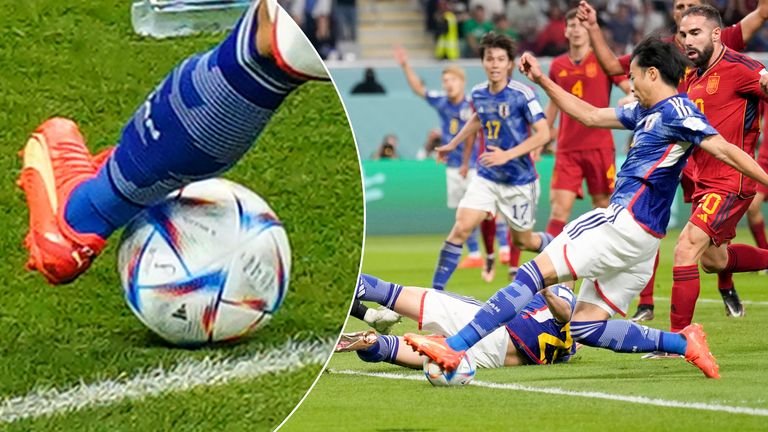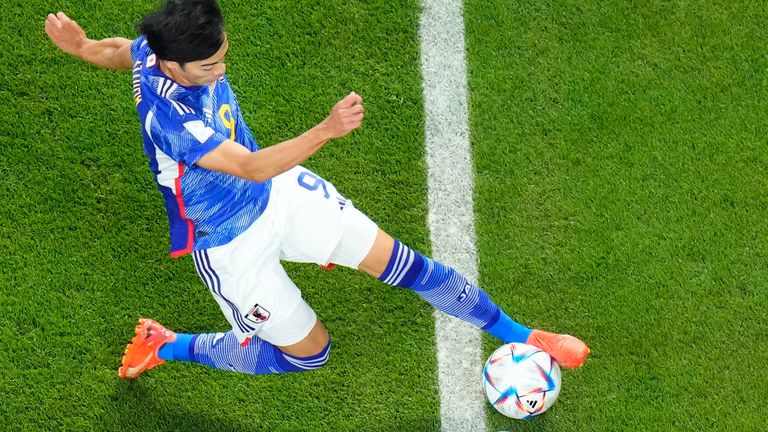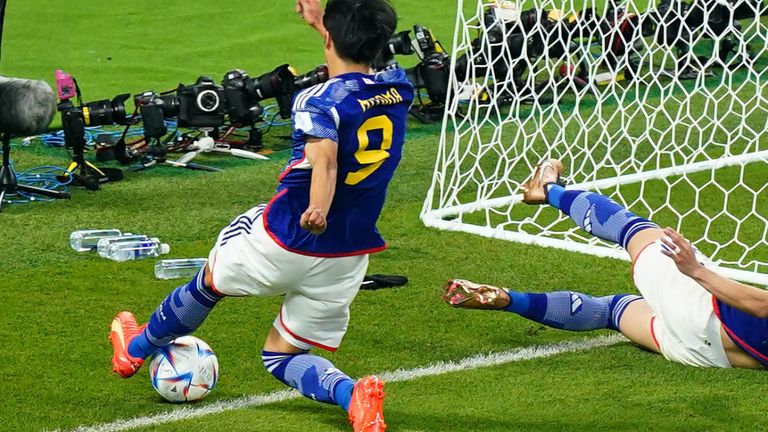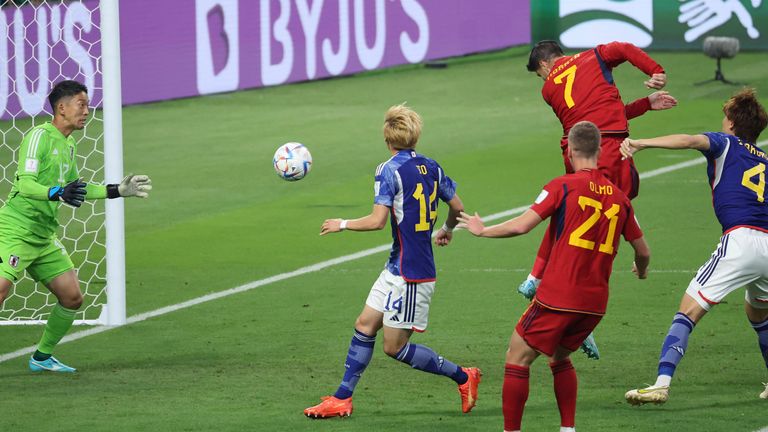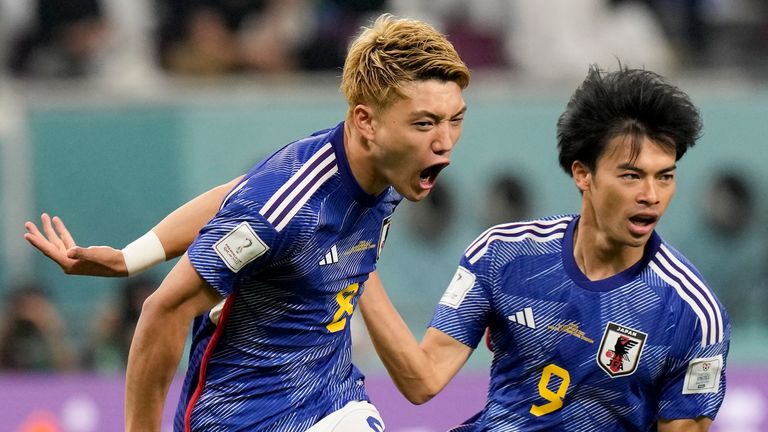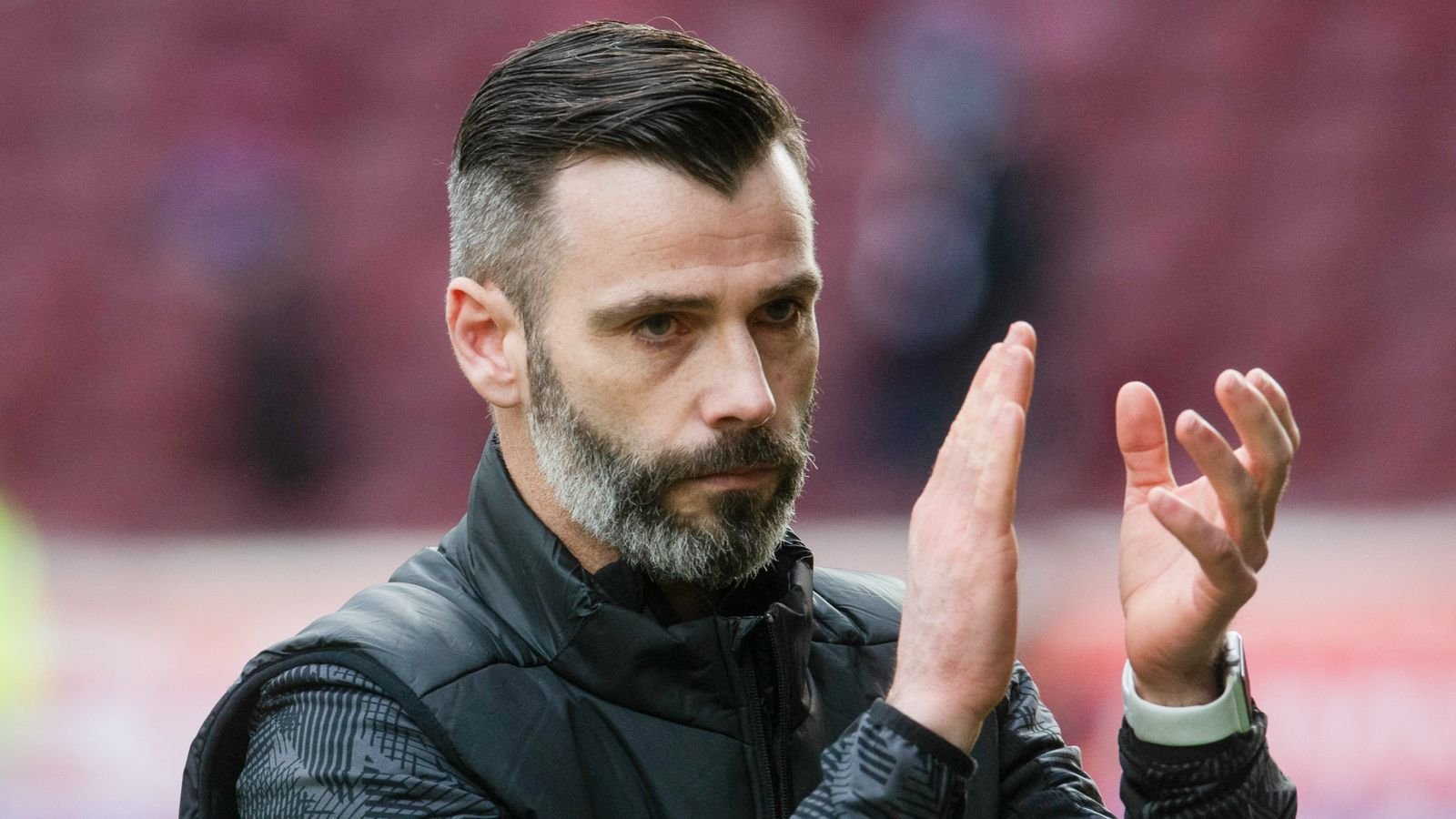[ad_1]
Japan pulled off another historic World Cup upset as a hugely controversial goal saw them come from behind to beat Spain 2-1 and claim top spot in Group E, with Luis Enrique’s side needing goal difference to advance as runners-up ahead of Germany.
Spain were utterly dominant in the first half at the Khalifa International Stadium and looked set to advance in first place after Alvaro Morata headed home his third goal of the tournament (11).
But it all changed in an extraordinary spell after half-time as substitute Ritsu Doan equalised with a shot from the edge of the box (48) and Ao Tanaka completed the turnaround from a Kaoru Mitoma cut-back which initially appeared to have gone out of play (51).
A lengthy VAR check followed the goal, but it sensationally ruled in favour of Japan, the full curvature of the ball not deemed to have crossed the line, leaving Spain, listless in the second half despite their earlier dominance, to sweat on their place in the last 16.
At one point, when Costa Rica went in front in their 4-2 loss to Germany, Spain were heading out along with Hansi Flick’s side, but in the end their superior goal difference, thanks to their 7-0 win over Costa Rica in their opening game, ensured they snuck through to knockout stages at the expense of the Germans.
Spain will now face Morocco in the last 16, while Japan, who also came from behind to beat Germany but lost to Costa Rica in a remarkable group-stage campaign, will take on Croatia.
The controversial winner in pictures
How Japan stunned Spain
Before all the drama of the second half, there was a totally serene first period for Spain, with Morata’s towering header from Cesar Azpilicueta’s cross putting them in complete control.
Morata had other opportunities, one from a Nico Williams cut-back and another from a Dani Olmo cross, but the one-goal margin looked sufficient given Spain’s complete dominance of possession.
What followed, though, stunned everyone watching, with Japan boss Hajime Moriyasu, whose substitutions turned the game against Germany, again using his bench to devastating effect.
The equaliser came after a poor pass from goalkeeper Unai Simon caused Spain to lose possession deep in their own territory, allowing Doan to unleash a powerful effort from the edge of the box which Simon got hands to but could not stop.
Then, another substitute made a decisive, and ultimately hugely controversial, contribution as Mitoma reached a cross at the byline and cut the ball back for Tanaka to bundle home from close range.
The on-field officials initially ruled the goal out, deeming the ball to have gone out, and despite initial replays appearing to back them up, VAR ruled that it should count, an aerial view later showing the ball had in fact not fully crossed the line.
Spain looked totally shell-shocked from then on, struggling to create clear chances as huge drama unfolded in the other game between Germany and Costa Rica.
At one point, Spain appeared to be crashing out, but Germany’s recovery ensured they remained in second place with a goal difference of six to the Germans’ one.
Japan finished the game with just 18 per cent of the possession, the lowest share by any winning team at a World Cup since records began in 1966, but the victory, on a breathless night, ultimately sent them through to the knockout stages for a second consecutive finals.
Neville and Souness question winning goal
Sky Sports’ Gary Neville questioned why television audiences were not shown all the angles of Japan’s winning goal afterwards.
He told ITV: “The high cam that is on the line does suggest that there might be some of the ball over the line.
“But from that very first offside goal, Ecuador vs Qatar in game one, I’ve struggled with it a little bit that we’ve not been given the correct angles, it just doesn’t feel right.
“In the Premier League we see all the VAR cameras, here we don’t.”
Sky Sports’ Graeme Souness added: “The longer they don’t show a picture that shows conclusively shows that it didn’t go out of play, you’re thinking something untoward is going on.
“There are 80 million Germans right now going mad, waiting for a picture that shows that ball didn’t go out of play.
“Germany is not a small footballing nation. Why would you create confusion and not want to clear it up immediately?
“Why are FIFA not showing us something that is so controversial?
“Why aren’t they showing it to us? Clear it up for us, please.”
What does the result mean?
Japan finish top of Group E with six points, meaning they will face Group F runners-up Croata in the last 16 on Monday, with kick-off at 3pm.
Spain finish second on four points, ahead of Germany on goal difference, and will face Group F winners Morocco in the last 16 on Tuesday, kicking off at 3pm.
Costa Rica finish bottom of Group E on three points and, like Germany, exit the competition.
Japan the comeback kings – Opta stats
- Japan have progressed to the knockout rounds in consecutive World Cup tournaments for the first time, while they’ve finished top of their group for the first time since 2002.
- Japan have become the third team in World Cup history to be losing at half time and come back to win two matches in a single edition, after Brazil in 1938 and Germany in 1970.
- Japan had just 18 per cent possession against Spain, the lowest share of the ball for a winning team in a World Cup match since records began in 1966.
- Three of Japan’s last four goals at the World Cup have been scored by substitutes, as many as they’d scored via subs in their first 20 goals in the competition.
- Alvaro Morata scored his ninth goal in just 13 appearances at major tournaments for Spain (World Cup and Euros). Only David Villa (13 in 16 apps) has scored more such goals for the country.
- At 25 years 98 days old, Spain started with their youngest XI in a World Cup match since their 3-1 defeat to France in the round of 16 in 2006 (24y 321d).
[ad_2]
Source link

